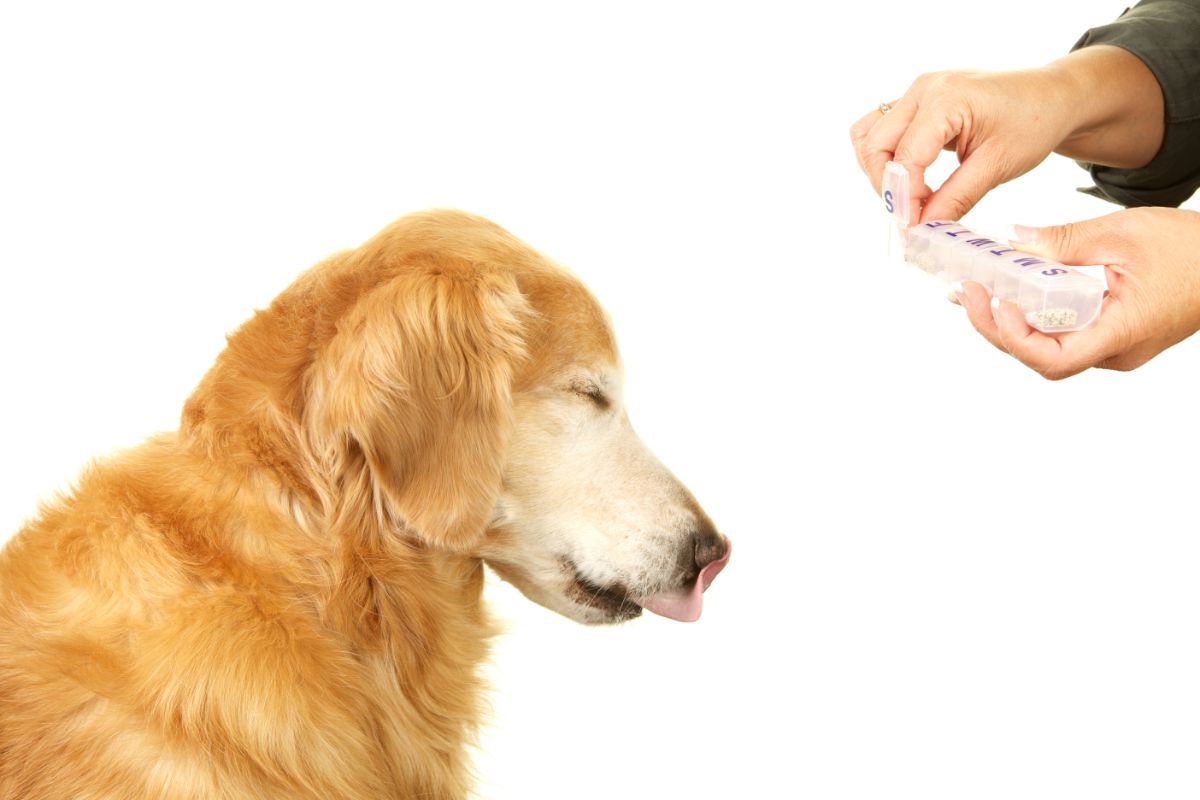Apoquel has been on the market for a long time, but when it first came out, it was insanely popular. It is a fantastic product that helped many dog owners ease their pup’s suffering.
But it does not come without a price. There are a bunch of side effects that can drastically change your dog’s life, and in extreme cases, end it.

The question is, what alternatives can you use? Apoquel is known for being effective, and it can save your dog from so much discomfort.
But, there are actually quite a few options that you could try instead of going for such an extreme and potentially dangerous drug.
So, in this article, we are going to go over five Apoquel alternatives that are better and more healthy for your dog.
What Makes Apoquel A Bad Choice for Your Dog?
This is not the kind of drug you should be used for short-term use or even for acute dermatitis. Apoquel is prescribed by veterinarians only when their patient is experiencing itchiness that they can’t find the cause of.
They will also try to use other medication before they turn to Apoquel, this is a medication that is a last resort. This is because this drug is one that your pup will likely be on for the rest of its life.
But before you make any decisions on your own, there are a few things that you need to consider. As such, we have listed the main risks associated with this medication down below.
Are There Side Effects?
The first thing that you need to think about is the potential side effects of using this medication on your dog, and there are quite a few.
For starters, your canine companion may experience vomiting and diarrhea while they are on this medication.
But there is a much longer list of side effects that your dog may encounter while they are on Apoquel.
This medication works by disrupting pathways within the immune system of your dog. When this happens, your pup may start to feel less skin irritation and itchiness due to the changing pathways.
But when the pathways are disrupted, there can be negative side effects. For one, it can interfere with the immune system and make it harder or more ineffective for your dog’s body to do important things.
Much like with similar drugs for humans, Apoquel can cause your pup to experience more infections.
The most common infections your dog will experience on this medication will be as follows: Demodex Mange, Ear Infections, Pneumonia, and more.
Because there is the risk of your dog getting a serious infection while on this medication, it is not given to dogs that are under a year old. This is because younger dogs will have weaker immune systems than older dogs.
But that is not the worst of it, while your dog is on Apoquel there is the risk of them getting bone marrow suppression and their white blood cell count becoming reduced.
On top of that, it is essential to note that kinase pathways are not only in the immune system. They can be found all over the body.
It is because of this that your dog can experience other issues such as the following: Anorexia, Lethargy, Heightened Cholesterol, Blood Lipase, and more.
Are There Links To Cancer?
Yes, sadly, there are some links to cancer for dogs that take Apoquel. The immune system may be important for helping the body safe from exterior dangers, like bacteria and viruses.
But, it is so much more essential than that, the immune system also helps the body to fight cancer within the body.
So when Apoquel rewires the kinase pathways, it means that your pup is more likely to get cancer.
Another side effect associated with this medication is that it has the potential to exacerbate neoplastic conditions.
In essence, this means that this medication can make cancer that is already in the body worse. This is not surprising when you consider how this drug works and what it does.
It disrupts the way that the immune system works, which can reduce your dog’s ability to fight cancerous cells that are within the body.
That being said, there is no hard evidence that Apoquel actually causes cancer cells to grow. But your dog may be more susceptible to developing cancer if they are taking this medication.
There was even a study done which indicated that about five percent of dogs that were on Apoquel were found to have a form of cancer.
As such, it is considered a common side effect of your dog developing cancer while on this medication.
However, this medication does have its place, especially when you want to prevent your pup from experiencing organ rejection.
But is it worth giving your canine companion this medication to relieve chronic itching? That decision is entirely up to you.
Can You Become Dependent?
As we have established, there can be some pretty bad side effects for your dog if they are on this medication. But there is another issue, it can become addictive to your dog’s system.
This drug is supposed to be given to your dog for extreme skin issues that have been causing your dog trouble. As such, your dog is not meant to be taken off this medication.
But what happens if you need to take your dog off Apoquel? Well, there was a case concerning a boxer, who has been taking this medication for some time.
The itchy skin was causing pain and discomfort for this animal for many years. They were given Apoquel, which helped the animal and eased their discomfort greatly.
So, why would the owner take their boxer off this medication? Well, you wouldn’t, but in this case, the medication sold out and there was none for the boxer to take.
For this animal in particular, the red and itchy skin returned with a vengeance and seemed to be much worse than it was.
You see, Apoquel is not actually a cure for the skin conditions it is tackling, it simply puts a band-aid on the issue and helps the dog’s immune system to refocus and compensate for the condition.
In essence, the dog’s immune system can fall into chaos and not understand how to deal with the issue as it used to. It can take some time for your dog’s immune system to get back to the way it was.
As such, it is important that you understand that your dog’s dermatitis or other skin condition can get much worse than it used to if you suddenly feel the need to take your pup off of this medication.

Is this A Pricey Choice?
Despite the grizzly side effects, it is not the cancer risk that makes owners look for different medications for their dog’s inflamed, itchy skin. It is in fact the sky-high price that has owners running for the hills in search of a better alternative.
Sadly, this price has not gone down over the years, as this is still an excellent treatment for pets with severe skin conditions. You can’t get this drug over the counter, instead, you will be getting a veterinary prescription for it.
Another drug that can be used to help your dog’s dermatitis, is prednisone, which costs more than eight-hundred percent less than Apoquel. However, this drug is not nearly as effective as Apoquel.
When you consider that you need to be paying for this medication for the rest of your dog’s life, the cost adds up pretty exponentially. This means that owners are more likely to go for a drug like prednisone, despite it not being as effective.
Before Apoquel arrived on the scene, the go-to drug for doggy dermatitis was a medication called Atopica. But it was scrapped from the market because of the effective Apoquel.
On top of that, Atopica had more negative side effects than Apoquel, which is quite a feat.
Sadly, there are not a lot of medications that can stand up to Apoquel. It is simply the most effective medication on the market for treating skin conditions for dogs.
But, drugs like Benadryl, Chlorpheniramine, and Antihistamines are cheaper and have significantly fewer side effects.
In short, if you aim to go for Apoquel, you need to understand that you will be paying quite a high price for this drug.
What Alternatives Are There For Apoquel?
Now that you know a bit about Apoquel and what makes it a bad choice for your canine companion, we can finally talk about what medications are a better alternative. Let’s get started!
1. What Environmental Allergens Can You Remove?
Dermatitis always has a cause. It is a symptom of a cause. In other words, there is an underlying issue that is causing dermatitis.
As such, it is important for you to find out what is causing the issue. It will be far better for you to find out what is causing the issue rather than treating the symptom.
Almost seventy percent of all skin conditions found in dogs are allergy related. As such, it is a good idea for you to start by looking at what environmental factors are causing your dog’s dermatitis.
Of these dogs with skin conditions as a result of an allergen, about ninety percent of them are reacting to an allergen that is airborne.
Most common on the list of airborne allergens are as follows: Dust Mites, Protein, Flea Saliva, and Pollen.
Take note of when your dog’s itchy skin flares up. Does it happen in the spring or fall? If this is the case, then it will likely be because there is a specific allergen present in the air.
If this is the case for your pup, then you have the luxurious option of using drug therapy only during the seasons your dog is experiencing dermatitis.
Bear in mind that you should not use Apoquel on and off, it is something that your dog should be on for good.
But you do not need to use drugs, there are different things that you can do to treat the underlying condition. For one, you could use a high-powered air purifier, which you can use indoors.
You can also change the HVAC filter often or simply reduce your dog’s contact with known allergens. Bear in mind that if your dog has several allergies or very sensitive skin, none of these issues will make enough of a difference.
If your dog happens to fall into this category, not all is lost. You may prefer to try immunotherapy. This treatment can even help to treat your dog’s allergies as a whole (see also “Natural Treatment To Treat Dog Ear Yeast Infection“).
This form of therapy will work similarly in both humans and dogs. First, your dog will need to be tested for allergies.
Once they have what is ailing your pup pinned down, the animal will slowly have the allergen introduced into their system. As time goes on, these doses will reduce.
In most cases, about seventy percent of their immune system will get used to the allergen and stop reacting. If this happens, your dog can end up completely cured of their allergy and dermatitis.
2. Is Your Dog’s Diet Affecting Their Skin Condition?
So, we have about seventy percent of dogs sorted out with our first suggestion. But, what about the other ten to fifteen percent?
If environmental allergens are not causing your dog to experience dermatitis? There may be something in their diet that is not agreeing with them.
Food allergies are not common, it is far more common for a dog to have food sensitivities and intolerances. Either way, your dog can get itchy skin because of their diet.
If this is the case for your pup, then you will need to start them on the elimination diet.
This is a diet for your pup where you remove all the likely allergens and very slowly reintroduce the foods until you find what is causing the itchy skin.
The question is, how do you find out what the allergens are? Well, any food that your dog has been consuming over the last few years is a potential allergen.
On the list of the most common allergens are the following foods: Beef, Dairy, Chicken, Wheat, Soy, Lamb, Corn, and Eggs.
That being said, there are many other foods that your dog may be allergic to. Each animal is unique, which means that they may be allergic to something that we have not mentioned on this list.
Check your dog’s favorite food and note down all the ingredients on the label. While it is entirely possible for your dog to be allergic to minor ingredients such as minerals, vitamins, or preservatives.
It is not a common allergy. On top of their main food, you may want to note down all the ingredients in your dog’s treats, medications, or supplements.
Everything on this list is not banned from your dog. It may be a challenge, but you now need to find food that does not have any of the ingredients you have listed.
It is recommended that you look for foods that have limited ingredients. For example, dog food that contains only protein and one starch.
You will not need to very slowly switch your dog’s food to the new one so that they get used to it. Once they are happy to eat their new food, your job now is to restrict their diet.
Do not feed them any food that was on your list. This includes treats and supplements as well.
Your dog needs to be on this new diet until you notice your dog’s symptoms clearing. This may be as long as two to three months.
If your dog’s dermatitis has not improved, then you may want to try a different diet with different ingredients. If this does not work then, sadly, it is likely that your dog does not have a food allergy.
While you are trialing your dog’s elimination diet, you should slowly introduce one food at a time. Pick one ingredient at a time and allow your dog to get used to it again.
If you do not see any of the dermatitis symptoms, return, then add another food back and wait another month.
Continue with this until you have worked your way back through the list or until you notice that your dog’s dermatitis has returned.
But if your dog does not have an allergy or food intolerance, it does not mean that food is not to blame. If your pup is not getting all the nutrients they need, they can develop a dry, brittle coat, itchy skin, and several other horrible side effects.
As such, you could try giving them a new food which contains named ingredients from a range of different animals.
Avoid filler ingredients like corn or soy. Instead, go for a food that contains a minimum of twenty-five percent protein and has a bunch of healthy fats.
This small change can make a huge difference for your dog and may even cause their skin condition to improve.

3. Are There Infections And Parasites Present?
Before you do anything drastic like putting your dog on an elimination diet or trying to figure out what environmental allergy they have.
You should probably make sure that your dog does not have a parasite that is causing them discomfort.
Something as simple as fleas or mites can certainly affect your dog’s skin condition and even cause dermatitis.
Fleas are one of the most common dog parasites, one bite can cause them to become very itchy and uncomfortable.
A small flea infestation can be super hard to miss, which is why you should take them to the vet if you think that your canine companion might have a flea infestation causing them itchy and dry skin.
Mange can be missed as well, this is because mites can live quite happily quite deep under the skin, which makes it hard for you to diagnose the dog until it is too late.
If there are other symptoms present, but your mange test has come back negative, you should take your pup to the vet.
There are many infections that can cause your dog to develop dermatitis. As such, it will certainly be worth it to do tests to find out what kind of parasites might be present on your dog.
4. Will Supplements Help Your Dog’s Skin Condition?
If changing your dog’s food can help sort out your dog’s skin condition, then you know that supplements will certainly be able to help as well.
For example, fish oil is a great supplement that can really help to improve the overall health of your dog.
Fish oils have a lot of omega fatty acids, which are insanely healthy for dogs. In fact, you can get rid of dermatitis in some cases by simply giving your pup some salmon or another type of fish oil.
You might also want to give digestive enzymes a try. Dog-specific enzymes are a great choice for dogs that are struggling with food sensitivity or intolerances.
These enzymes can really help to break down the food that your dog has eaten.
If you happen to have an animal that does not have specific types of enzymes in their system, then you may find that they cannot digest food as a normal dog would.
This can cause nutrition deficiencies, which in turn can cause varying skin disorders like dermatitis.
If you want another natural supplement, you might want to consider trying yucca and quercetin. These supplements can have an almost steroid-like effect.
This is a fantastic option for those of you that have a pup that has taken Benadryl for the itching and seen success.
5. What Topical Remedies Can You use?
You may find that a topical cream, balm, or ointment might do the trick for your dog’s itchy skin. A bunch of owners has found that this is a very useful medication for dogs. Especially if they experience dermatitis flare-ups or hot spots.
You can purchase remedies from your vet, or you can make a remedy on your own. Something as simple as coconut oil can do wonders.
It can really help the skin and coat to improve in quality. But, that is not all, coconut oil also has healing properties.
Simply mix your coconut oil with some lavender or peppermint essential oil to create a remarkable skin treatment for your pup.
Alternatively, you could use chamomile tea mixed with baking soda, oatmeal, and apple cider vinegar. This mixture is essentially an all-natural anti-inflammatory balm that you can use to help treat skin disorders.
Regardless of what you go with, it is important that you do not use these natural methods if there are any other underlying issues.
It is more important to make sure that your dog is happy and comfortable. If that means that you need to give them vet-prescribed medication, then that is what you need to do.
But, it does not hurt to try out methods like this for your pup. You never know, it might work!
Final Thoughts
We hope that you have enjoyed reading this article and learning about these five alternatives to Apoquel. While using this drug can be useful for extreme cases, there are a lot of risks involved for your canine companion.
Because of this, we strongly recommend looking for alternatives. Remember that dermatitis is a symptom of a greater cause.
Which in essence means that your dog has dermatitis for a specific reason. Like an allergen parasite or another reason.
Hopefully, you learned something new by reading this article, if you did, then you will love our other articles. We have a range of articles on our website which you are sure to find interesting.
Thanks for reading!
If you enjoyed this post, you might like our article about ‘Natural Treatment To Treat Dog Ear Yeast Infection‘.
- How To Teach Your Puppy Their Name Easily! - July 18, 2023
- Is Your Puppy Counter Surfing? Find Out How To Stop It! - July 18, 2023
- How To Train Your Puppy For Car Rides: Everything You Need To Know - July 18, 2023










